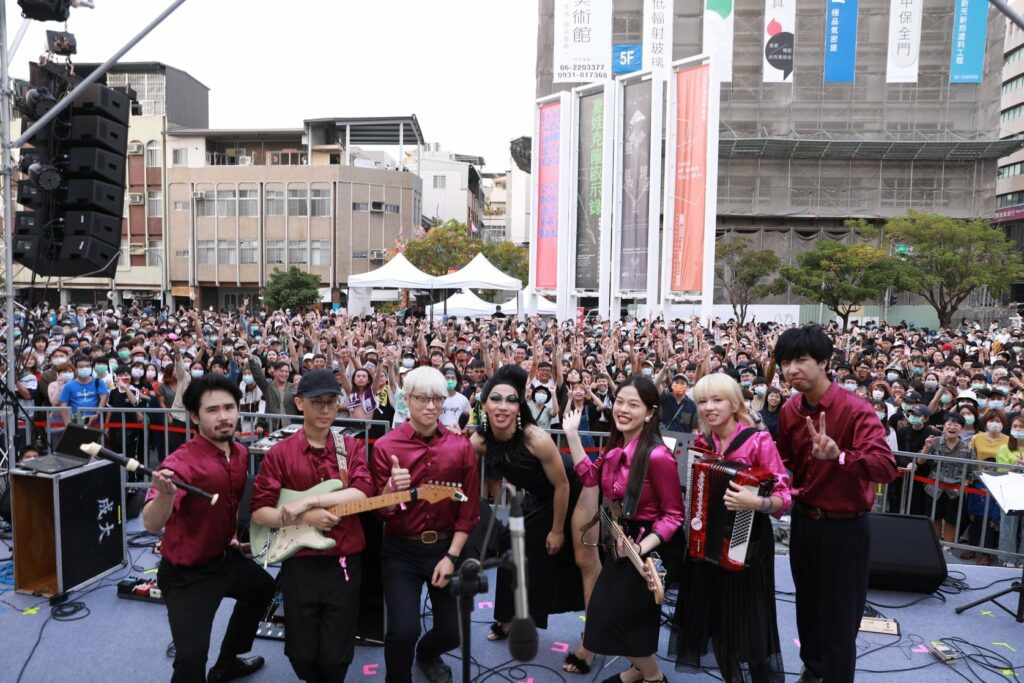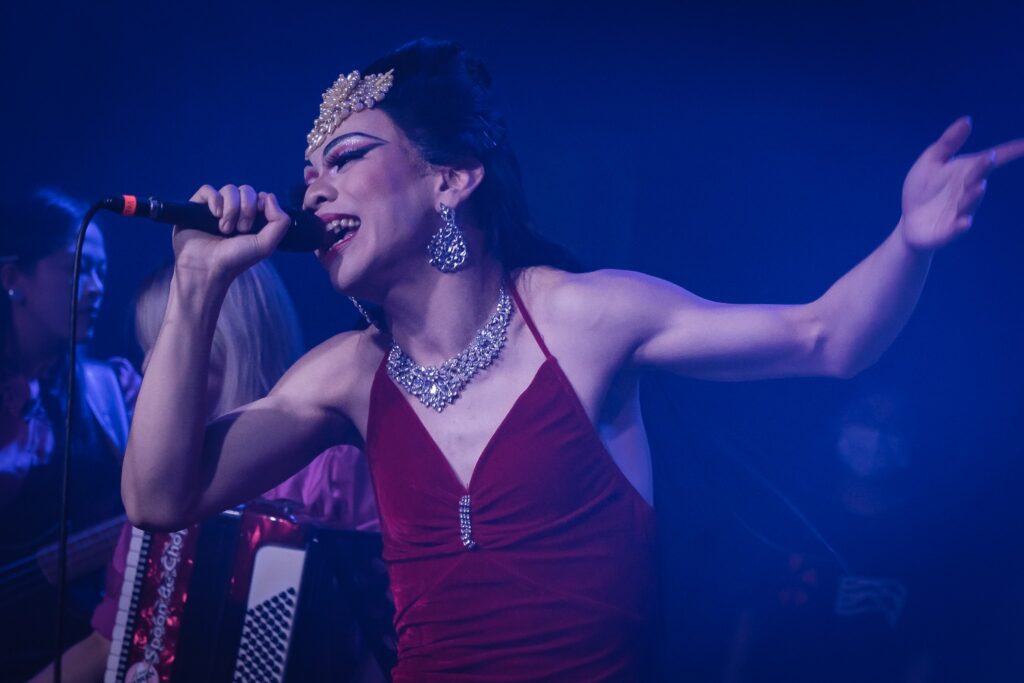In late November last year, I went down to Tainan for LUCfest, a kind of SXSW for Taiwan in years where a raging pandemic isn’t wreaking havoc with global touring itineraries. With international artists unable to fly in, the festival went with an entirely local lineup in 2020, giving fans a chance to appreciate homegrown talent on a grand commercial scale.
The West Central District was packed with fans wandering between venues indoor and out, killing time between sets at historic landmarks and famous old snack stands and restaurants scattered about the wide streets and narrow, winding offshoots surrounding. As I walked past the hulking cubist monstrosity of Building 2 of the Tainan Art Museum, I happened upon an old friend, Louie Lu (呂鴻志), vocalist of Tainan-born metal band Burning Island (火燒島). He was standing next to the outdoor stage at the museum, where a large crowd had gathered, swelling from a rear entrance of the building all the way to You’ai Street.
I was doing my usual thing, wandering around nervously before my own band’s set, indoors at the museum later that evening. I had every intention of catching up with Louie for a few minutes then carrying on. Louie, though, told me I should stick around for the first band of the day on the outdoor stage. I wouldn’t want to miss it, he said. So, I decided to stay, maybe take in a song or two, see what all the fuss was about.
As the crowd buzzed with anticipation, a frantic woman ran out onto the stage, crying out that there were no people around, launching into a short dramatic intro reminiscent of a stage play or the heavily accentuated interactions between puppets in a local puppet theater performance. The rest of the band joined her, the guitarists launching somberly into the opening arpeggios of “House of the Rising Sun.”

Disfigured Sisterhood at LUCfest 2020. (Photo courtesy of Disfigured Sisterhood.)
As the rise and fall of the solemn melody rang out over the PA, a figure clad in a long black veil joined them. It was Qi Peng, lead singer for the band. As Qi Peng’s haunting voice, like a modern-day Grace Slick, held the audience enraptured, she took them through “Dai Jie Nu,” in fact an adaptation of “Rising Sun,” the theme song for a glove puppetry show by the name of “Liuhe Sanxia Chuan,” the story of a woman who stays loyal to her badly disfigured fiancée.
As the song plodded on, the figure beneath the veil gesticulating with slow, deliberate grace, the sheer fabric slipped down, hitting the stage, revealing that the source of the melodious beauty washing over the crowd was in fact a man in drag. Qi Peng, in a slinky qi pao type dress, with garish false eyelashes and thickly applied foundation, had arrived. A raucous cheer went up from the audience, and the band proceeded to hold the crowd spellbound for then next 40 minutes in a performance that was equal parts experimental theater, drag queen bombast and a mix of Taiwanese and Western musical styles that make genre-labeling an exercise in absolute futility.
I asked Louie the name of the band that, before the festival had even begun, seemed to have stolen the show. He thought for a minute about how to translate it. “Disfigured Sisterhood,” he said after a moment’s pause. Then, like the rest of those assembled there between Building 2 and You’ai Street, he fell back under the spell of Qi Peng and the band, casting their musical voodoo under the merciless Tainan sun.
If the music of Disfigured Sisterhood is a conjuring of disparate influences, mingled in the ever-evolving audio discourse of what might loosely be called the Taiwan indie sound (a push and pull between local and western influences), then Qi Peng’s own story is that of a person ever conscious of their place within this creative tempest.
Growing up in front of a temple, Qi Peng was exposed to dramatic and musical performances in the temple square, wherein the sounds of traditional gongs and drums evolved into that of electric pianos and synthesizers. Studying jazz piano in his youth, he dreamed be becoming a superstar singer, but in his dreams, he was always a woman. Taking an evening bath as a child, he envisioned himself as Alicia Keys or Beyoncé. Though just a kid, he was already taken with the way things around him that were inherently Taiwanese were evolving in the broader global cultural context, as Taiwan opened up to the world, and the world came flooding in for the first time in earnest.
“I'm fascinated by this cultural reconstruction—performing with Western instruments and technically evolved instruments combined with traditional instruments,” says Qi Peng. “Or, like this song,” the singer goes on to discussing their version of “Dai Jie Nu,” “it's a cover of a Western song but it becomes the theme of a traditional glove puppetry shows.”
Then there is the dramatic component, Disfigured Sisterhood combining their musical performance with something like an off-kilter, Off-Broadway play, interacting among themselves, playing with the audience with equal parts calculated timing and improvised hilarity.
For each performance the band embarks on, Qi Peng chooses a theme, and the band actually writes a script that they go over again and again in the practice space, leaving room for spontaneity, of course. It’s the kind of thing that could easily go off the rails or seem forced and awkward in a less cohesive unit, but Disfigured Sisterhood lay it down like a veteran Vaudeville troupe.
“The interactions between the members actually come from the chemistry we've built during rehearsals,” says guitarist Zachary. “For example, Wenchi [synthesizers] and I sometimes fool around on stage, and we don't need to say anything. Just a gesture is all we need to know what kind of interaction we're about to have.”
It’s hard to imagine such a grandiose exploration of the mingling of cultures, musical styles, and artistic experimentation on anything other than the big stage. From the band’s costumes to the unfolding onstage drama, Disfigured Sisterhood seems something far better suited for the likes of high-capacity concert halls and festival main stages than it is to the cramped confines of indie music venues.
In fact, as Qi Peng points out, the cabaret costumes were initially more of a front than anything else—something to disguise their lack of confidence in a new sound they were exploring; a kind of retro chic Taiwanese folk rock. From early on, after the band first started performing live in May of 219, it was clear to Qi Peng and the rest of the band that theirs was a different beast attracting a different audience. Whereas the Taiwan music scene as a whole is usually highly fragmented, with but a few bands generating crossover appeal, Disfigured Sisterhood, with its unapologetic exploration of humor, drag culture, and varied musical and dramatic influences from folk, to rock, to punk and its post offshoots, the band realized it was building something that couldn’t be contained on the small stage for long.
“When I was on stage and saw more diverse audiences, not just dancing to our music but immersing themselves in our story, says Qi Peng, “I started to believe that we need such a large stage to influence and infect more people. It may be because of the efforts we've put into the shows, from the soundtrack to the dancers and the scripts. We've worked very hard to practice and they are delicately designed. That's why they attract the audience, and it achieves what I want—the audience can't take their eyes off the stage.”
Still, the band worries local audiences might see the costumes, the singer in drag, the humorist tendencies of the band’s social commentary, as little more than a gimmick—a fast, cheap laugh amidst a three-day festival bender, thrown in with some good music, of course. But a gimmick, nonetheless.
“They haven't seen this kind of stuff in their gig experiences,” Zachary says of the audiences they have played to, under 20 gigs thus far. “Although we're not relying on the gimmick to sell tickets, it does passively contain the element under these circumstances. We hope that in our future shows, the audience will continue to think about the story we conveyed over and over again, and then come up with their own different views.”
Whether what Disfigured Sisterhood does onstage is perceived as a gimmick by the casual fan or not, one can’t argue with the quasi-spiritual dimensions of the performance—the coy, winking idolatry that makes you laugh first, listen second, and finally turns you into a raving convert. Humor aside, the topics the band tackles are serious ones, ranging from personal identity to gender issues, forced evictions, and the plight of migrant workers in Taiwan. All of this is conveyed through Qi Peng, the focal point and the messenger, who takes on another form on the stage, engaging in something like a shamanistic ritual, embodying a holy presence and giving voice to it via his godly vocal range.
“I consider myself as a vessel when I'm on stage. I summon Tieguanyin into my body,” says Qi Peng, here referring to a variety of tea, but possibly playing on the “Guanyin” portion of the word, referring to the Buddhist goddess of compassion. “I comfort people with the stories and perceptions that my body holds. It's just that the fans have been misunderstanding and thinking I'm a female,” she goes on, speaking to the perceptions and reception he has received as a cross dresser. “As for positive or negative comments, those are their business.”

Qi Peng, lead singer of Disfigured Sisterhood. (Photo courtesy of Disfigured Sisterhood.)
Like all artists that manage to captivate and transcend the barrier between mere band and cultural touchstone, Disfigured Sisterhood has hit upon something undefinable, seeming to come along in a place and at a time when and where they are needed most. But it’s early for them yet. Many a promising band has portended great things then faded just as quickly into obscurity.
They’ve got that elusive thing, though, and no, it isn’t just because it’s trendy to laud all things gender non-conforming these days. To say the band is popular because the lead singer is a drag queen is missing the point, and doing a disservice to the multitudes of hard work the band has put in.
Disfigured Sisterhood is popular because they have a vision and the intestinal fortitude to see it through to fruition. They’ve got confidence, and the skill to back it up. More importantly, they truly believe in themselves, and know the difference between hype and results, and are aware of just the right time to turn on the self-effacing humor, and when to crank up the rock star bravado. Asked to sum up Disfigured Sisterhood and his own performance, Qi Peng puts it sublimely.
“When on stage, I am a god who saves people and looks down at the world with a smile.”





